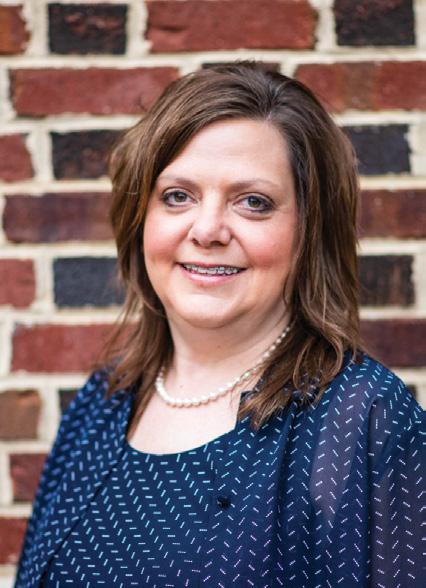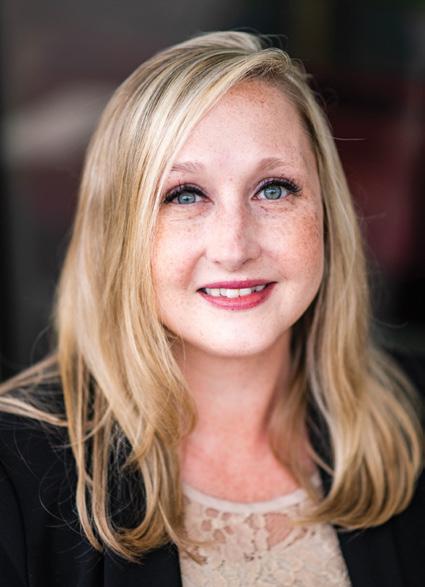
6 minute read
DNP alumnae implement COVID-19 protocol
– Patra Reed (’93, ‘16DNP)
Advertisement
DNP graduates Patra Reed (’93, ‘16DNP) and Jill Delawder (‘18DNP) both work for Sentara Rockingham Memorial Hospital in positions that have been instrumental in developing and executing strategies in the workplace to deal with the onset and progression of the pandemic. Reed is the hospital’s Director of Community Health Services and serves as the Blue Ridge Regional Director of Integrated Care Management. Delawder is the Nurse Manager of Patient Care Services; Nursing Professional Development, Diabetes, Enterostomal Therapy & Life Support. We asked them to share their recent experiences and how their DNP training helps them to manage the ever-changing conditions in health care today.
How has the COVID-19 situation affected you at work, your facility and personally?
Reed: Our day-to-day operations in nursing leadership has become “a work in progress” during this time with all focus on COVID-19. We are unable to meet face-to-face in groups so our work all happens by conference call, computer meetings and through direct rounding with our staff and patients. Days are spent planning for multiple scenarios and how each one can be handled in the most effective and efficient manner. Our work is focused around allocating resources and supporting our staff. I work closely with both our local and system teams to assure process standardization as well as addressing specific local needs. As leaders, we are regularly looking at projections and how our system is prepared to assist our community. Regular communication with staff is essential and key to keeping members of the team informed and updated. I do constantly worry about staff—how are they doing, are they “okay,” what can I do to make them feel more secure? I worry about our patients and about our community. We want to shield them from this, keep them all safe. I worry about my family, am I taking anything home to them? I worry about my extended family that I am not able to see during this time. There are just so many emotions during this time. Time at home is spent with my husband who is still working full-time, also at a healthcare organization and with my teenage son who is navigating a rigorous online school schedule. The emotions are intense and raw at times. It is a heavy feeling-unlike anything I have felt in 27 years.
Delawder: I think that many healthcare providers did not realize that COVID19 would have as much of an impact as it has. For me and my professional development team, we were tasked with “training up” staff from procedural areas to help care for patients in medsurg, intermediate care, and critical care areas. A system taskforce was developed to create a modified “rapid” new hire orientation, as well as competency checklists for staff who were being trained-up for reallocation. Various other teams were created to work on urgent processes such as code blue, critical care standards of care, visitation, personal protective equipment, etc. As a leader, it was overwhelming but important to keep up with communicating the frequent changes that occurred. Staff, although they have been inundated with information, have remained positive and continue to focus on ensuring patients are safe and do not feel alone. Personally, having recovered from COVID-19, along with my husband who fought multi-focal pneumonia, I have a much different perspective of the pandemic. I understand the feeling of helplessness when your loved one is taken to the hospital and you can’t be with them. I also understand the “need” to be with family, but now having been a positive COVID19 patient myself, I am even more hesitant about any contact with my family.
I would encourage everyone to take a deep breath and remember the “why” behind social distancing and quarantine and to think about what is important to them (hair, family, children, concerts?) and can it wait if that would prevent causing harm to someone they love.
Has the situation changed your outlook on nursing?
Reed: Even more than ever, I see nurses as resilient and eager to take on the next change in practice we implement. Nurses “show up” in a crisis – are flexible and able to adjust to changes to best meet the needs of their patients. Even when situations may not be optimal, nurses put their patients first and work to meet their individual needs. Nurses in every role have been impacted by COVID-19. I have watched nurses who have not worked clinically for many years go through refresher courses to both restore past skills and learn new tasks. No complaints are heard, just offers to help in any capacity needed. Many nurses are currently working in areas that are not their normal workplace and assisting in roles that several months ago would have not been a familiar arena. Nurses are caring for the critically ill, making operational plans, triaging patients, connecting patients to families by iPad, and providing a compassionate conversation for patients without visitors. The enormity of the situation has weighed heavily on my shoulders at times but I have also kept the patient at the center and I know that I have an army of other nurses standing right behind me for support. I believe this has truly elevated the role of nursing as a central core in today’s health care environment. Nurses have shown their ability to adapt and take the lead in many different ways as we acclimate to the new normal. I have never been more proud to be a nurse.
Delawder: I believe the COVID-19 pandemic has opened my eyes to all of the things that we take for granted as a community and as a healthcare worker. For example, vaccinations and the importance of herd immunity. As a healthcare worker, it has brought forward that maybe we have not been as diligent about isolation precautions as we should have been historically. It has also made me wonder if we should have always been wearing a mask and goggles for all patient encounters? Should we always mask at work?
Do you think your DNP education helped you to be better prepared to handle the situation?
Reed: Absolutely! My DNP education gave me a more solid foundation in critical thinking while collaborating with the larger healthcare team. I was able to take rapidly changing information and formulate sustainable plans that could be adapted in a moment’s notice. I have been able to use my educational preparation to lead my teams through unchartered times, using the available evidenced based science and data. DNP preparation offered me the ability to think and lead in innovative and creative ways which has been essential in this time. I have also incorporated my education in public health frameworks. This is a very different way of thinking for those of us in the acute care setting. We continue to develop strong collaborative relationships with our community partners and work together in building appropriate strategies. Interdisciplinary partnerships have been a key to successful approaches and interventions for patients and team members.
Delawder: I believe my DNP education enabled me to use systems thinking in the evaluation of population-based healthcare needs, organizational structure and function with staff reallocation, as well as interprofessional collaboration in the delivery of evidence-based practice for altered standard of care. DNP education made it easier for me to multi-task, prioritize and to find available resources to guide decision-making.











